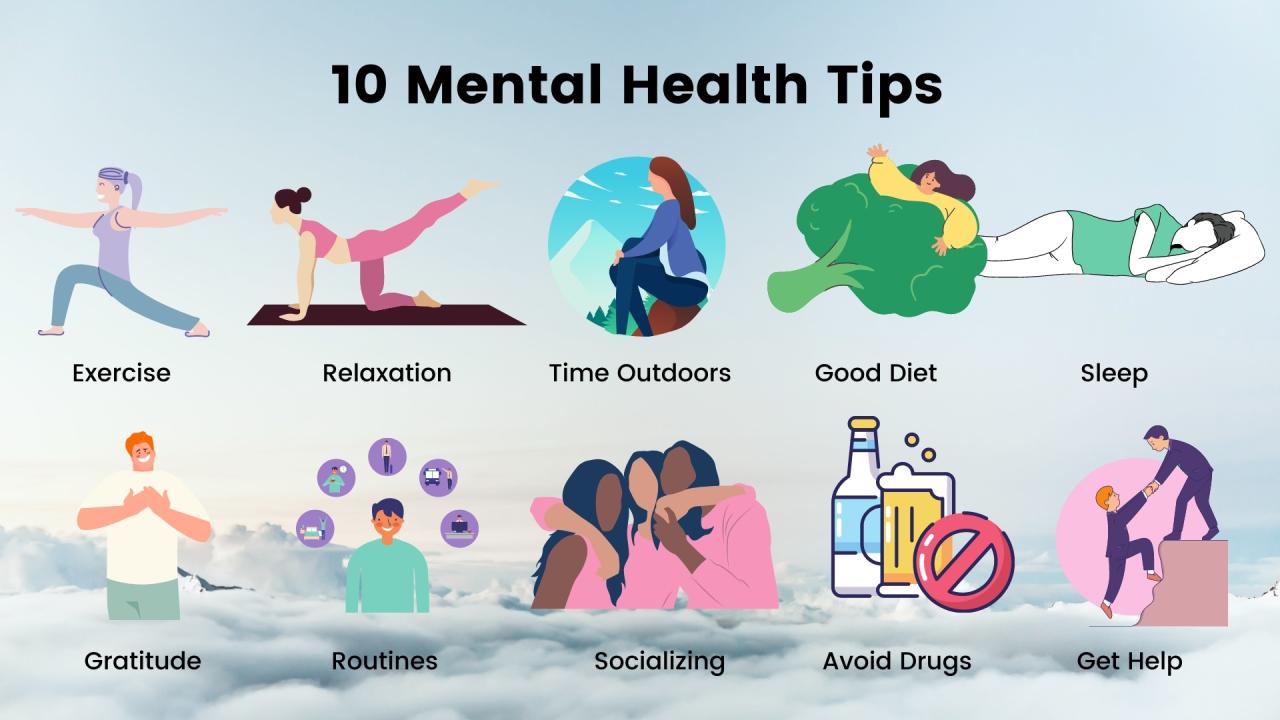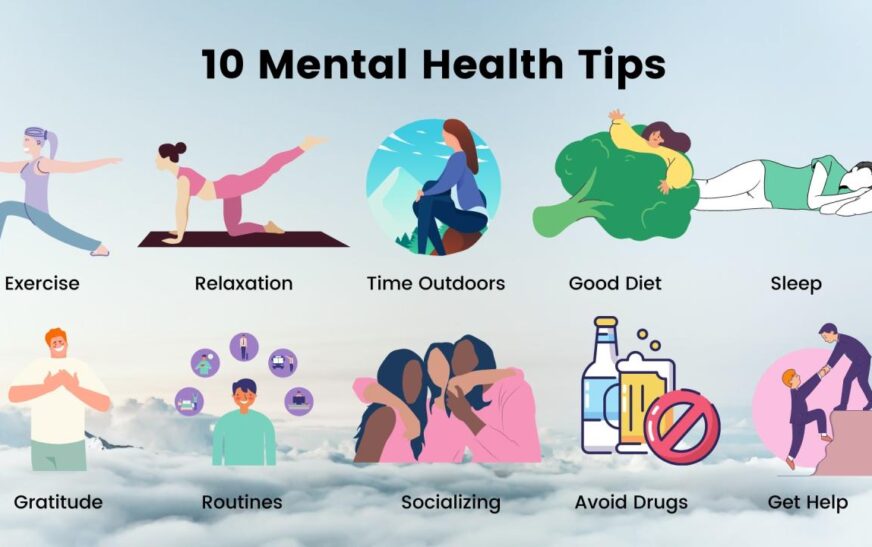Tips for Balanced Mental Health delves into the importance of mental well-being and offers valuable insights into maintaining a healthy mindset. From stress management to self-care routines, this discussion explores various strategies to promote a balanced mental state.
Exploring the significance of healthy habits and the benefits of seeking professional help, this guide aims to provide a comprehensive understanding of how to achieve and sustain mental wellness in today’s fast-paced world.
Importance of Mental Health
Mental health is a crucial component of overall well-being as it impacts how we think, feel, and act on a daily basis. It influences our ability to cope with stress, make decisions, and form relationships with others.
Positive Impact of Balanced Mental Health
Having balanced mental health can positively impact daily life in various ways:
- Improved Productivity: When our mental health is in check, we are better able to focus, concentrate, and perform tasks efficiently.
- Enhanced Relationships: Balanced mental health can lead to better communication, empathy, and understanding in our interactions with others.
- Reduced Stress: Maintaining good mental health can help in managing stress levels effectively and prevent burnout.
Connection Between Mental Health and Physical Health
There is a strong connection between mental health and physical health, with one significantly impacting the other:
- Physical Effects: Mental health issues such as anxiety and depression can manifest physically through symptoms like headaches, muscle tension, and fatigue.
- Immune System: Chronic stress due to poor mental health can weaken the immune system, making individuals more susceptible to illnesses.
- Lifestyle Choices: Mental health influences our lifestyle choices, including diet, exercise, and sleep patterns, which in turn affect our physical well-being.
Tips for Maintaining Balanced Mental Health
Maintaining balanced mental health is crucial for overall well-being. Here are some strategies to help you manage stress effectively, prioritize self-care routines, and incorporate mindfulness and meditation practices into your daily life.
Managing Stress Effectively
Stress is a common occurrence in daily life, but it’s essential to find healthy ways to manage it. Here are some tips:
- Acknowledge your stress triggers and work on addressing them.
- Practice relaxation techniques such as deep breathing, yoga, or progressive muscle relaxation.
- Engage in physical activity to release endorphins and reduce stress levels.
- Set boundaries and learn to say no when feeling overwhelmed.
- Seek support from friends, family, or a mental health professional.
Importance of Self-Care Routines
Self-care routines play a significant role in promoting mental wellness and preventing burnout. Here are some self-care practices to consider:
- Ensure you get enough sleep to recharge your body and mind.
- Eat a balanced diet rich in nutrients to fuel your brain and body.
- Engage in activities you enjoy and that bring you joy and relaxation.
- Practice self-compassion and treat yourself with kindness and understanding.
- Take breaks when needed and prioritize your well-being over productivity.
Benefits of Mindfulness and Meditation
Mindfulness and meditation practices can help you stay present, reduce anxiety, and improve overall mental well-being. Here are some benefits:
- Enhanced focus and concentration by training your mind to stay in the present moment.
- Reduced symptoms of anxiety and depression through regular practice.
- Improved self-awareness and emotional regulation skills.
- Decreased stress levels and better coping mechanisms in challenging situations.
- Promotion of a sense of inner peace and contentment in daily life.
Healthy Habits for Mental Well-being
Regular exercise, proper nutrition, and quality sleep are essential components of maintaining good mental health. These healthy habits not only contribute to physical well-being but also have a significant impact on our mental well-being.
The Significance of Regular Exercise in Improving Mental Health, Tips for Balanced Mental Health
Exercise is known to release endorphins, also known as the “feel-good” hormones, which can help reduce feelings of stress, anxiety, and depression. Regular physical activity can also improve sleep quality, boost self-esteem, and increase cognitive function. Whether it’s going for a jog, practicing yoga, or hitting the gym, incorporating exercise into your routine can have a positive impact on your mental health.
Explain the Role of Nutrition in Supporting a Healthy Mindset
Nutrition plays a crucial role in supporting a healthy mindset. Consuming a well-balanced diet rich in fruits, vegetables, whole grains, lean proteins, and healthy fats can provide the necessary nutrients for optimal brain function. Certain nutrients like omega-3 fatty acids, B vitamins, and antioxidants have been linked to improved mood and mental clarity. Maintaining a healthy diet can help stabilize your mood, increase energy levels, and enhance overall mental well-being.
Share Tips on Getting Quality Sleep for Better Mental Well-being
Quality sleep is essential for mental health as it allows the brain to rest and recharge. To improve your sleep quality, establish a consistent sleep schedule, create a relaxing bedtime routine, and ensure your sleep environment is conducive to rest. Avoiding caffeine and electronic devices before bed, practicing relaxation techniques like deep breathing or meditation, and creating a comfortable sleep environment can all contribute to better sleep and improved mental well-being.
Seeking Professional Help: Tips For Balanced Mental Health
Seeking help from mental health professionals is crucial for managing and overcoming mental health issues. These professionals are trained to provide support, guidance, and therapy tailored to individual needs, helping individuals navigate their challenges and improve their overall well-being.
Therapy Options
- Cognitive Behavioral Therapy (CBT): CBT focuses on changing negative thought patterns and behaviors to address mental health issues such as anxiety and depression.
- Psychodynamic Therapy: This therapy delves into past experiences and unconscious thoughts to address present-day issues.
- Interpersonal Therapy: This type of therapy focuses on improving communication and relationships to alleviate symptoms of mental health conditions.
Reducing Stigma
- Educate Yourself: Learn about mental health to understand that seeking help is a sign of strength, not weakness.
- Share Your Story: By opening up about your own journey with mental health, you can help reduce stigma and encourage others to seek help.
- Normalize Therapy: Discussing therapy openly and positively can help break down barriers and normalize seeking professional help for mental health.
Conclusive Thoughts

In conclusion, Tips for Balanced Mental Health serves as a beacon of knowledge and guidance for individuals looking to prioritize their mental well-being. By implementing the strategies discussed here, one can strive towards a harmonious balance between mind and body, leading to a more fulfilling and enriched life.
Q&A
How important is mental health for overall well-being?
Mental health is crucial for overall well-being as it impacts how we think, feel, and act in our daily lives.
What are some tips for managing stress effectively?
Some tips for managing stress include practicing relaxation techniques, engaging in physical activity, and maintaining a healthy work-life balance.
Why is seeking help from mental health professionals important?
Seeking help from mental health professionals is important because they can provide specialized support and guidance tailored to individual needs.






